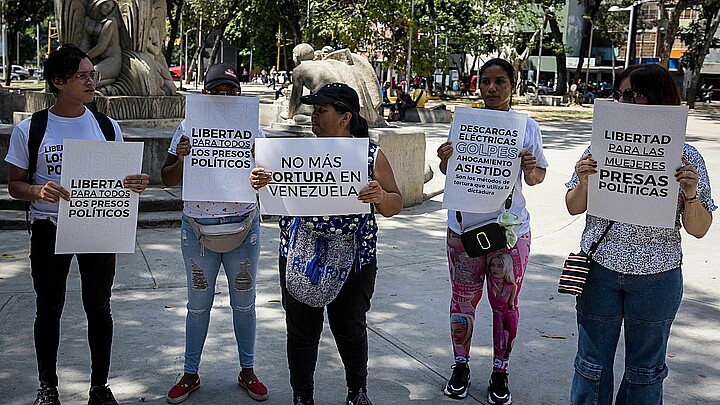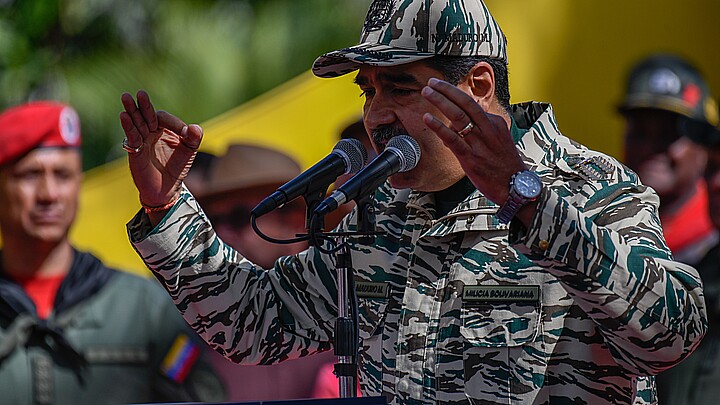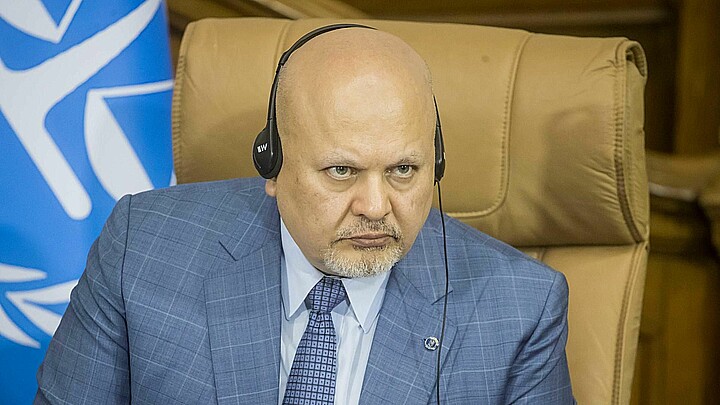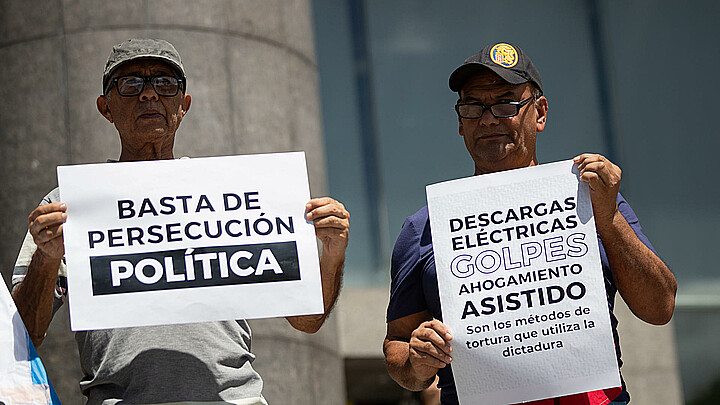Human Rights
AMNESTY INTERNATIONAL: This is what a 'systematic policy of repression' looks like in Maduro's Venezuela
“They are completely innocent, they don’t even have any political affiliation,” said one family member. “Now they are trapped in an underground jail cell, and we don’t know when they will be free"
February 10, 2022 1:58pm
Updated: February 11, 2022 9:07am
A new study from Amnesty International warns that calculated repression by the socialist regime of Venezuela’s Nicolas Maduro could constitute “the crime against humanity of persecution.”
The report, released on Thursday, highlights how the policy of repression in Venezuela has been based on the “coordination of attacks and stigmatizing messages broadcast by media” with links to the regime and cautioned that such attacks have been used to justify politically motivated arrests by Maduro’s security forces.
“The world has known for years about the policy of repression that Nicolás Maduro’s government has put in place,” said Erika Guevara-Rosas, Americas director at Amnesty International.
“Our research shows that there are instances where there is an extremely high correlation between public stigmatization and politically motivated arbitrary arrests. This correlation is a new indicator of a systematic policy of repression and points to the crime against humanity of persecution, which must be investigated by the international justice system,” she added.
Similarly, a new report from The Guardian outlines how Venezuelans on the ground have been affected by the smears, stigmatization and arbitrary arrests – a sad reality for a population that has struggled to survive in a country plagued by increased criminal violence, soaring inflation and a lack of food and medical supplies.
Juan Carlos Marrufo Capozzi and his wife Maria Auxiliadora Delgado Tabosky were first arrested in 2019 after agents from the regime’s military intelligence unit raided their home for unknown reasons. Although they were released last October, the couple was apprehended hours later and now faces charges including terrorism and treason.
Their arrest made headlines in the government-controlled media – as is often the case when individuals are detained on illegitimate charges in Maduro’s Venezuela.
“They are completely innocent, they don’t even have any political affiliation,” said one family member. “Now they are trapped in an underground jail cell, and we don’t know when they will be free.”
The couple – both of whom hold European passports – remain in prison and their family is concerned that the conditions under which they are held is leading to a rapid deterioration of their physical and mental health.
“Their detention makes no sense, and they are in a very bad way psychologically,” one family member said. “Juan Carlos is having suicidal thoughts because he’s been falsely accused of the worst crimes that there are. He needs help.”
In January, a U.N. working group on arbitrary detentions took notice of the couple’s plight and said their arrest was part of a “systemic practice of depriving people of their liberty without respect for the rights enshrined by international law.”
According to the group, such a practice “could constitute crimes against humanity.”
The couple’s family and their lawyers have both posited that Marrufo and Delgado’s arrest could be retribution for a run-in Delgado’s brother, Osman Delgado Tabosky, had with the regime.
The Miami-based businessman was accused of financing an assault on the Fort Paramacay military base in August 2017 and of plotting an assassination attempt on Maduro in 2018.
He has since been labelled a terrorist by Maduro’s judiciary.
“It’s clear that there’s no guilt there, it’s just vengeance against María’s brother,” said Alfredo Romero, a lawyer with Foro Penal, a Venezuelan rights watchdog that is working on the couple’s case. “They are political prisoners, and of the 240 political prisoners currently in Venezuela, 91 have been detained for more than three years without even a trial.”
Emirlendris Benítez Rosales is another Venezuelan that has been detained by Venezuelan security forces and has yet to stand trial. The young Venezuelan was accused – without evidence – of being part of the plot to assassinate Maduro and has been jailed since August 2018.
According to the U.N. working group, Benítez was three weeks pregnant when she was arrested and lost her unborn child while in jail. Since her arrest, she has endured beatings and torture at the hands of Venezuelan security forces and is now confined to a wheelchair.
“The papers said they found drugs in her car and some parts of the drones that were supposedly used to kill Maduro, and that she was trying to flee the country, but that’s all a lie,” her sister, Melania Leal Rosales, said. “They were looking for blame where there is none.”
“We can only hope that the investigation follows through to the end,” she added. “My sister is innocent and she can’t take much more.”
As the political and economic situation continues to deteriorate in Venezuela, Maduro has fought to resist challenges to his legitimacy – especially from supporters of Juan Guaidó’s U.S.-backed opposition party.
This has meant that the regime’s security forces have increased their persecution of enemies – both real and imagined.
Mass protests rocked the country in 2017 and were met with brutal repression – leaving thousands of demonstrators injured – or worse – detained. Arbitrary imprisonment also means torture for countless Venezuelans and ADN America recently reported on the brutal torture methods employed by the General Directorate of Military Counterintelligence in state detention centers.
Yet although the International Criminal Court (ICC) announced that it would launch an investigation into the Venezuelan government for possible crimes against humanity last November, many Venezuelans have lost faith in the ability of international organizations to bring about justice.
“People have been and gone before and the regime is still in power,” the couple’s family said. “It’s hard to keep the faith when reports get written but nothing ever changes.”










